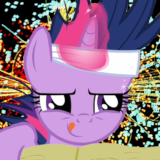The Indistinguishability of Magic and Technology · 10:28pm Apr 26th, 2014
According to Arthur C Clarke's excessively quoted words of wisdom: “Any sufficiently advanced technology is indistinguishable from magic”. [1]
It's a nice line. Cute, concise, and sufficiently unscientifically defined that it can be either true or false depending on how you choose to interpret it.
From the perspective of a writer it nicely sums up the equivalence of science fiction and fantasy. Magic is a plot device to allow a character to do something unnaturally awesome. But if magic seems too old-school for your futuristic story, just relabel it as some sort of hyper advanced technology. No one will notice that it's still basically the same thing.
Or if technology seems inappropriate for your fantasy world of talking ponies, just replace modern gadgetry with 'magic'.

We live in a world in which technology is more and more designed to resemble magic. Our cell phones are stylish black rectangles, with bright coloured screens to display the latest PMVs by a process which we may as well call magic. This is not just a trendy design fad, it's good engineering. The complexity of a phone is far more than any single engineer can master. But it's divided up into units, which are sub-divided into units, and further sub-divided. Each unit treated as a black box, where the engineer learns the rules of how it behaves, but as as for what goes on inside – it might as well be magic. Of course another engineer will understand it, but she won't go beyond her bit...

This abstraction is a fundamental part of electrical engineering. The only way such complex systems can be put together is by ignoring the physics behind the individual components and modelling them with simple rules. You may as well assume it works by magic.
At the same time, the magic which we read about in our fictional worlds is more and more made to work like technology. We want magic wands which go zap! And achieve whatever it was that the user wanted. Like a TV remote, only much more awesome.
In pre-industrial times, the usual way of exercising power was to shout instructions at a minion. This was reflected in the fics of the day, where magic usually involved summoning some sort of spirit/demon/djinn who would be magically enslaved and forced to obey any command. In these enlightened times, we don't approved of our fictional characters keeping slaves, hence in our stories, we prefer magic which works like our modern way of exercising power – technology.
Let's finish by looking at another of Arthur C Clarke quotations: “When a distinguished but elderly scientist states that something is possible, he is almost certainly right. When he states that something is impossible, he is very probably wrong.”
I'm not going to contradict this. But in my experience, when elderly scientists state that something is possible, it is because they are so close to retirement that they know that it won't be them that has to do the work to get it working. Possible maybe – but very likely completely impractical.
And when they state that something is impossible?
This is usually in answer to a question like, “is it possible that the LHC could produce a black hole which will destroy the world?”
To which the most honest answer is: “Anyone who thinks that is a twat”. [2]




The historical difference between "science" and "magic" is that science is subject to experimental disproof, while magic is not. Proof of this fact is that some early fields of science, such as astronomy and chemistry, started as magic -- astrology and alchemy. Stating that, it is obvious that "magic" in Equestria is actually "science" -- because it is practiced by experiment and analysis. Likewise, much that we know scientifically and do technologically today would seem "magical" to earlier ages.
More fundamentally, nothing can be both real and supernatural. If, for example, ghosts were real, they would not be "supernatural," since they would obviously be part of our Universe and affect it through some Natural processes. If they really were "supernatural," they would be nonexistent. Hence, if magic is real, it's not supernatural, it's natural by definition.
One of the best examples of science wandering into the magical realm, is in the most advanced chips, where strained silicon is used. That is, its not just the existing matter that works, but matter forced to exist in a state and behave in a manner totally unnatural to itself, and if anything, in a partial nonmaterial, energy based state.
A quick couple of examples of directly combining general relativity and quantum mechanics. GPS, and Laser ring gyros.
Oh, and Octonion math is your freind when combining the equations.
I hate magic that just mimics technology in stories.
There's another kind of magic besides the technological—the kind that's inexplicable and utterly mysterious. Usually the key to such magic is something moral, like a door sealed with a magical seal that only the pure of heart can break through, or like an act of true love thawing a frozen heart. And this is the kind that is most interesting in stories.
Attempts to explain or mechanize such magic are always hopelessly brutish and cynical.
I'm pretty sure the second Clarke quote refers to the scientist making unsolicited statements of possibility, not answering questions by sensation-seeking scientific illiterates.
In any case, I never considered the paralleled increased sophistication of user interfaces in magic and technology until now. Thanks for that.
Also, I'm pretty sure quantum mechanics occur in some fae realm of witchcraft and sorcery, and that's coming from a guy who studied them for several years. Heisenberg was almost certainly a wizard.
2052875
I think it's largely because of Clarke's law, and similar observations, that scientists hardly ever dismiss something as impossible.
You learn from experience not to phrase statements in a way that allows someone to subsquently prove you to be wrong.
Reporters know that they can use this to get scientists to say that something is possible, when really, it isn't.
On the basis of a search through my mailbox, I would propose the law that: When a distinguished but elderly scientist states that something is impossible, he is almost certainly talking about parking on the university campus.
3.bp.blogspot.com/-6UHjvLOTtoM/T6iaP1jE8XI/AAAAAAAABOw/FpFNecso-KU/s400/edwardelric3.png
It's a science!
2052936 So ya'll have parking problems across the pond, too, I see.
Even the question of whether the LHC could destroy the world could be answered "Well... technically? If you had 10^40 identically prepared universes it might somehow cause the destruction of one of them through some ridiculous series of circumstances, but that's true of most anything." However, if you said that, all that would be reported is the first sentence.